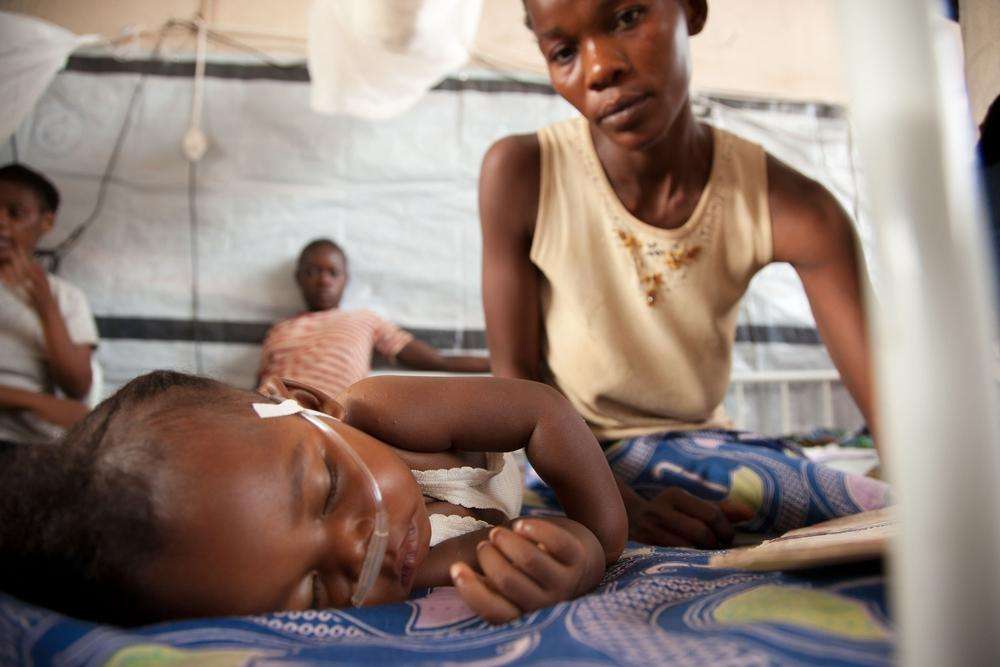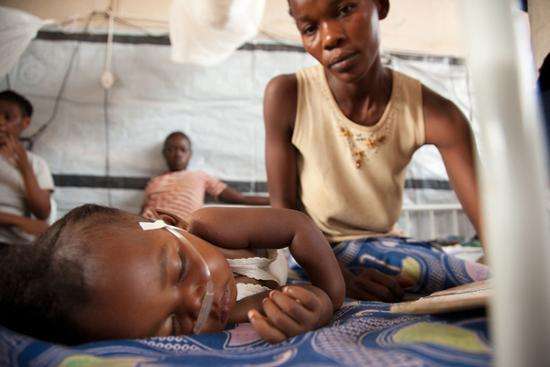This past December, Doctors Without Borders/Médecins Sans Frontières (MSF) issued an alert about a measles epidemic in northern Democratic Republic of Congo (DRC)’s Equateur and Orientale provinces, trying to draw attention to the situation and the lack of resources available to health personnel responding to the emergency. Two months later, however, the measles epidemic is still afflicting tens of thousands of children in the area.
The disease is extremely contagious and can spread quickly in countries like DRC that have large gaps in their health care systems. The effects can de devastating. Measles leads to serious medical complications in patients. Mortality can reach up to 15 percent, or even as high as 25 percent in extreme instances.
Since March 2012, MSF has treated more than 18,500 patients and vaccinated more than 440,000 children, but it is clear that many more need assistance. “We see lots of small, recently dug graves along the roads,” says Nathalie Gielen, manager of an MSF team returning from Djolu health zone in Equateur. “We counted 35 dead in one village. A father told us that he had lost seven children in three weeks. Traveling from village to village, we hear just one word: measles. People are frightened and hopeless. They’re asking for help.”
An Ongoing Crisis That Began in 2010
“This situation is only the latest development in an ongoing epidemic that has affected the entire country since 2010 and is particularly deadly among children under five years of age,” says Amaury Grégoire, MSF deputy head of mission. "It is unacceptable that anyone still dies of measles in the twenty-first century. A very effective and cheap vaccine is available and protects after a single dose. Yet, in countries like DRC, hundreds of thousands of children have never been vaccinated and continue to die of such an easily preventable disease.”
The extent of the need has overwhelmed DRC’s health system. Many health facilities are barely operational. Those that are operating frequently run out of drugs and struggle to find qualified staff, and absence of passable roads makes it very difficult to reach and supply them. The cold chain, which is critical to ensure that the vaccine is effective, is often broken in the most remote areas because of lack of equipment or electricity. In the Yahuma health zone in Orientale Province, where MSF has vaccinated 76,000 children, the health center has only two refrigerators and one broken motorcycle to serve an area half the size of Switzerland.
This situation makes it particularly difficult to provide access to medical care. Most of the population lives in remote villages and under the poverty threshold, meaning they cannot travel to access treatment. Furthermore, even though an epidemic has been declared, some people are still charged for medical attention in public health centers.
Health Centers That Do Exist are Empty or Inaccessible
Martine has brought her 10-month-old daughter, Asiata, to the hospital in Dingila. The baby has measles with respiratory complications. They traveled 20 kilometers [about 12 miles] on foot to obtain medical care provided by MSF. In the intensive care unit, Félicien says he walked two days to bring Israël, his three-year-old son, who is in critical condition due to measles-related complications. “Our health post has no medicine,” he says. He reports that two children in his village have already died en route to the hospital.
In this vast, forested region, people must often walk for several days to obtain medical care. Going to a public health center is often a last resort—after trying traditional medicine—and only if they can afford it.
“The parents arrive when the child has already developed medical complications, such as acute respiratory infections or malnutrition,” says Dr. Jehu, who heads the MSF team at the Buta hospital. “Some also have malaria. We treat many children with multiple, simultaneous medical complications. Many die in their village because the health facilities cannot provide adequate care.”
Reaching the Most Distant Health Zones at All Costs
MSF continues to alert the health authorities because the epidemic is far from over. The organization is expanding its activities and continues to vaccinate children and treat patients, including those requiring hospital-based intensive care. It is supporting medical facilities, training local staff, alerting the population to the availability of free care, and referring the most seriously-ill patients.
“The treatment of children affected by measles-associated medical complications is very difficult, even in a well-equipped intensive care unit. But no child should get to a hospital due to measles, because it should be so easy to prevent,” concludes Dr. Mathieu Bichet, MSF deputy program manager.





